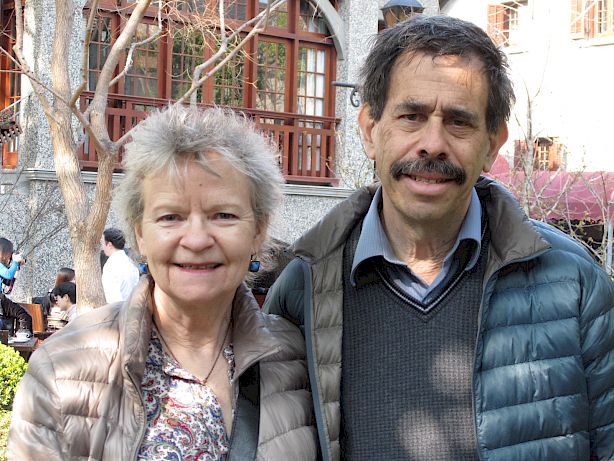Jane Burbank and Frederick Cooper win 2023 Toynbee Prize

Jane Burbank and Frederick Cooper have been named the joint winners of the Toynbee Prize for 2023. The Toynbee Prize Foundation recognizes the value and importance of collaborative work in global history, and seeks in particular to recognize Jane Burbank and Frederick Cooper’s equal contributions to their important work of global history, Empires in World History: Power and the Politics of Difference (Princeton University Press, 2010), in addition to honoring their distinguished individual contributions to the field.
Burbank and Cooper were unanimously selected as the joint winners of the Prize by the Toynbee Prize Foundation's Board of Trustees. Each has played an important role in highlighting the history of regions that are at times marginalized in global historical narratives—for Burbank, Russia and Central Asia, and for Cooper, Africa and the western Indian Ocean.
Jane Burbank is internationally recognized as a leading scholar of Russia and its empire. Her first monograph, Intelligentsia and Revolution: Russian Views of Bolshevism, 1917-1922 (1986), explored the interpretations of the revolution of 1917 by Russian intellectuals. In the 1990s she advocated a revival of attention to Russia’s imperial past, enriched by intellectual collaboration with scholars from post-Soviet space. Two books on Russian empire followed: Imperial Russia: New Histories for the Empire, edited with David L. Ransel (1998) and Russian Empire: Space, People, Power, 1700-1930, edited with Mark von Hagen and Anatolyi Remnev (2007). Meanwhile, she wrote the pathbreaking monograph, Russian Peasants Go to Court: Legal Culture in the Countryside, 1905-1917 (2004). Presenting extensive quantitative and qualitative analyses of legal cases in lower courts, Russian Peasants Go to Court overturned long-standing assumptions that Russian peasants were indifferent to law. Several articles by Burbank have been influential across disciplines. “An Imperial Rights Regime” challenged the view that modern rights discourses always referenced Enlightenment understandings of natural rights. “Russia’s Legal Trajectories,” co-written with Tatiana Borisova, offers a provocative interpretation of Russia’s long-term, imperially articulated legal system. Burbank is now working on a study of Russian empire and sovereignty in the province of Kazan
Frederick Cooper is a renowned, prolific African historian who has written ten single-authored books. Plantation Slavery on the East Coast of Africa (1977) and From Slaves to Squatters: Plantation Labor and Agriculture in Zanzibar and Coastal Kenya, 1890-1925 (1980) established Cooper as an expert on the history of coerced labor in the Indian Ocean world. His next books, On the African Waterfront: Urban Disorder and the Transformation of Work in Colonial Mombasa (1987), and Decolonization and African Society: The Labor Question in French and British Africa (1996) explored the relationship of labor history to social change and anti-colonial politics in mid-century. A coedited volume on colonialism with Ann Stoler (Tensions of Empire, 1997), followed by Cooper’s Colonialism in Question: Theory, Knowledge, History (2005), solidified his reputation as an analyst of empire. Cooper’s prize-winning Citizenship between Empire and Nation: Remaking France and French Africa, 1945-1960 (2014) offers a sweeping analysis of the politics of imperial citizenship. In provocative essays, Cooper has reflected on Africa’s place in world history and on the value and limitations of widely-used concepts in history and the social sciences, including “identity,” “modernity,” “globalization,” “nation-state,” and “development.” His works have contributed to the development of global/world history studies from non-Western perspectives or in the context of the Global South.
Burbank and Cooper’s most important advancement of the field of global history was their co-authored book, Empires in World History. It is a landmark work of global history that combines extraordinary breadth with sophisticated analysis. They argue that for centuries empires, rather than nation-states, were the dominant political units in the global order. The book emphasizes the ways empires as composite polities governed “different people differently” and it incorporates legal, political, and cultural historical approaches. It especially elucidates as an important feature of empire the “politics of difference”: processes of defining, creating, governing, and manipulating differences among various ethnic, religious, and regional groups, with the intention of strengthening the state’s power over a diverse population, though sometimes leading to an opposite result. Widely cited and influential, Empires was awarded the 2011 Bentley Prize from the World Historical Association.
Both Dominic Sachsenmaier (Göttingen), President of the Foundation, and Darrin McMahon (Dartmouth), Foundation Vice-President, applauded the Board of Trustees decision: “The Foundation is extremely pleased with this year’s nomination, which not only honors the work of two outstanding individual historians but recognizes the collective nature of their scholarly partnership and contribution,” McMahon said.
The Toynbee Prize is awarded biennially "for work that makes a significant contribution to the study of global history.” In winning the Prize, Burbank and Cooper join a distinguished roster of recent Toynbee Prize recipients, including Kenneth Pomeranz, Lauren Benton, Dipesh Chakrabarty, Christopher Bayly, Michael Adas, and Jürgen Osterhammel.
Jane Burbank and Frederick Cooper will formally accept the Prize and deliver the Toynbee Prize Lecture at the Annual Meeting of the American Historical Association in January 2023.
Watch their Prize lecture here: